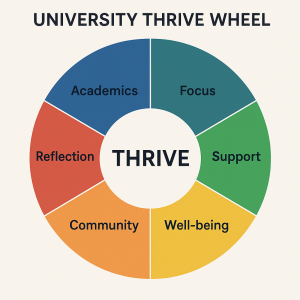Starting university marks a new chapter filled with freedom, opportunity, and—let’s be honest—some serious challenges. Whether you’re moving out for the first time, balancing coursework with part-time work, or exploring new social circles, university life requires intentional strategies to thrive. This guide offers actionable advice to help you manage academics, grow personally, and build a university experience you’ll be proud of.

Design Your Semester with Purpose
In high school, a bell schedule and assignment sheet often kept life structured. At university, the rhythm is yours to set—and without a plan, it can feel chaotic. Begin the semester by visualizing your ideal outcome: the grades, learning experiences, social growth, and self-care routines you want. What does that look like, and what do you need weekly to reach it?
Once goals are clear, break them down:
-
Academic layout: Map out exams, major assignments, group presentations, reading-heavy weeks.
-
Weekly schedule: Dedicate consistent blocks for deep work, classes, social and extracurricular commitments.
Treat your schedule as a living document—adjust as deadlines shift and unexpected plans arise. Designing your semester turns university from passive attendance into purposeful engagement.
Commit to Deep Work, Not Just Study Hours
It’s easy to fall into the trap that long study hours equal success. However, research shows that focused, uninterrupted sessions—typically 45–60 minutes—outperform marathon study weeks. These sessions, often referred to as “deep work,” allow your brain to isolate, integrate, and retain information more effectively.
To build this habit:
-
Use timers and tools.
-
Block distractions.
-
Take planned breaks.
-
Rotate subjects to keep your brain engaged.
Quality beats quantity. Those who study actively with strategic focus consistently outperform those who log hours passively.
Learn Actively — Ditch Passive Reading
University lectures and textbooks provide material, but true learning happens when you process, question, and apply information. Passive reading and note-taking rarely lead to understanding.
Instead:
-
Summarize and condense lecture points in your own words after class.
-
Create cheat-sheet cheat sheets—one-page visual summaries of key ideas or formulas.
-
Solve extra problems, even if they aren’t assigned.
-
Teach concepts to peers or simply talk them through aloud.
Through activities like these, information stops being words on a page and becomes integrated understanding you can recall and use.
Collaborate Intelligently — Form the Right Study Groups
Group work is a staple of university life. When done well, teams become spaces of deep exploration. To maximize group time:
-
Keep groups small (3–5 people) and goal-oriented.
-
Turn each session into a “teach-back” opportunity: each member prepares to explain a topic to the group.
-
Practice future exam questions aloud and provide supportive feedback.
-
Draft outlines together before projects to share ideas early.
In smart groups, teaching others doubles as learning; plus, it builds soft skills essential for your future.
Navigate University Support — It’s There for a Reason
From writing centers and academic advisors to mental health counselors and peer mentors, university offers more support than many students use. These resources exist to help you succeed—not just survive.
-
Visit early if a concept isn’t clicking or deadlines feel overwhelming.
-
Use career and internship services long before graduation.
-
Attend workshops for writing, presentation skills, or stress management.
Using support is a strategic move, not a sign of failure. Remember: your success reflects well on the university, too.
Balance Academics with Life-Wide Learning
University is your stage to explore intellectual curiosities and life skills beyond coursework. Whether through leadership roles, creative hobbies, or internships, pursue experiences that offer growth.
Ask yourself:
-
What’s my WHY this semester? Skills, passions, social connections?
-
What activity aligns with my purpose?
-
Are my extracurriculars sustainable with academics?
Balance doesn’t mean equal time—it means integration. Good extracurriculars reduce stress, open doors, and keep you energized.
Protect Mental Health and Avoid Burnout
Stress spikes around midterms and finals, and without self-care, it’s easy to hit burnout. Instead of pushing nonstop:
-
Schedule weekly unplug time—walks, journal uploads, creative projects.
-
Prioritize 7–9 hours of sleep consistently.
-
Learn meditation, yoga, or ancient breathing rituals for focus and calm.
-
Share feelings early—don’t wait until exhaustion sets in.
Mental and emotional well-being is foundational, not optional. Burnout is avoidable when you build your life with intention.
Build Meaningful Relationships and Networks
University isn’t only for learning from books—it’s also where relationships shape who you become next. Fellow students who challenge, support, and inspire you can last a lifetime. So can professors and mentors who see potential in you.
-
Meet with professors during office hours—not just before exams.
-
Explore mentor programs to connect with seniors or alumni.
-
Invest in deep friendships where you feel seen and understood.
-
Take chances: join clubs, study circles, or volunteer groups where you’ll fit in and also stretch.
A support network is a lifeline during challenges—and the core of unexpected opportunities too.
Reflect Regularly and Iterate
Halfway through the semester? Stop and ask: What’s working? What isn’t? Reflection is a powerful tool—to tweak study tactics, workflows, and priorities.
-
Assess academic habits: Are you practicing deep work? Engaging with materials actively?
-
Review routines: Is your sleep schedule realistic? Are you overcommitted?
-
Re-engage your purpose: Is everything you’re investing in moving you toward your vision?
Use this data to pivot your strategy. Iteration keeps your semester alive and adaptive to change.
Final Word: University Thrive Is Within Reach
University isn’t just about earning grades—it’s about cultivating independence, curiosity, and resilience. When you intentionally design your learning, obligations, and growth, you thrive academically and personally. Start by picking one area—deep work, active learning, or meaningful connections—and lean into it this week.
No ideal student lives stress-free 24/7. But those who flourish know they define their success, shape their routines, and actively engage in the life they’re building. You can absolutely be one of them.

